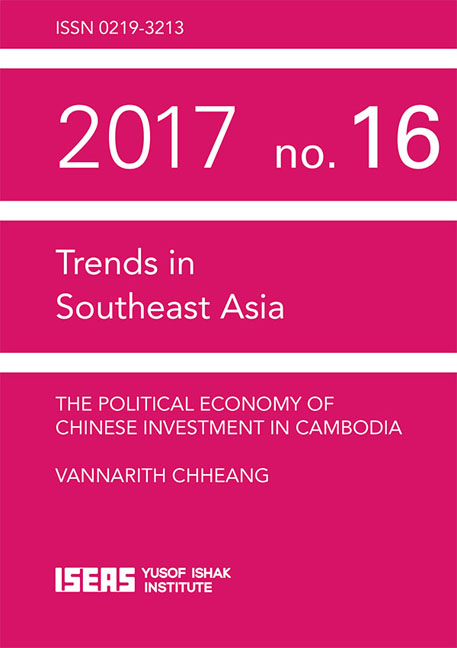The Political Economy of Chinese Investment in Cambodia
Published online by Cambridge University Press: 12 March 2019
Summary
INTRODUCTION
China's rising economic and political clout has created both opportunities and challenges for Southeast Asian countries. China's economic cooperation with Southeast Asian countries is multidimensional and multi-layered involving business collaboration, trade and investment, and financial assistance (grants and concessional loans), which are “fused indistinguishably”. Although the Chinese have claimed that their financial assistance has no strings attached, there is a close link between economic ties and political influence. Some regional analysts argue that “China's rise exerts a profound and complex impact on the political, security and economic contexts of Southeast Asia”. A Cambodia expert, Sophal Ear, puts it this way, “Taking the geopolitical interests of China in Southeast Asia into account, Chinese investment does not come free; political and economic strings tie those who benefit to the influence of China.”
Cambodia, a small and less developed country in the region, is largely perceived to be under strong influence from China due to the high level of economic dependency and power asymmetry — some valid, some overstated. China is now Cambodia's top donor and investor. It has strong interest in regional power projection and Cambodia is regarded as a core strategic partner. The analyst David Koh argues “having a strong ally in Cambodia means China occupying a central position on Indochina”.
In addition to economic interests, Cambodia has its own political and strategic calculation and interest in embracing China. Being geopolitically and geo-economically “sandwiched” by two big neighbours, Cambodia has China as a “protector” and counterweight to Vietnam and Thailand. China helps strengthen the legitimacy of the government, under the leadership of the Cambodian People's Party (CPP).
This paper provides an overview on Chinese investment in Southeast Asia in general and in Cambodia in particular. It discusses the perception of Cambodian stakeholders towards Chinese investment and its implications on Cambodia's domestic politics and foreign policy.
CHINESE INVESTMENT IN SOUTHEAST ASIA
The presence of Chinese commerce in Southeast Asia dates back to the third century when official missions were despatched to countries in the South Seas (Nanyang). These missions were then followed by Buddhist pilgrims and later, during the Song dynasty, by traders.
- Type
- Chapter
- Information
- Publisher: ISEAS–Yusof Ishak InstitutePrint publication year: 2017



